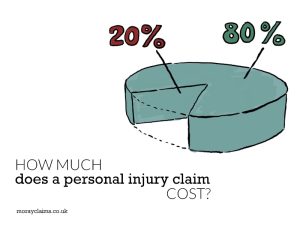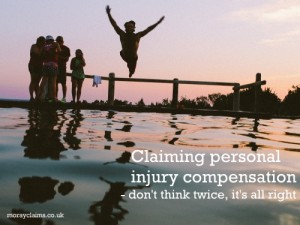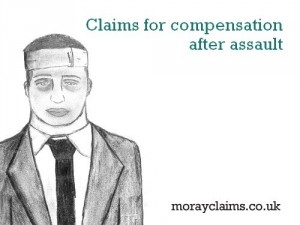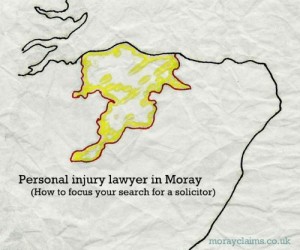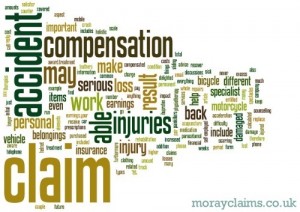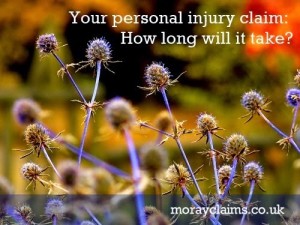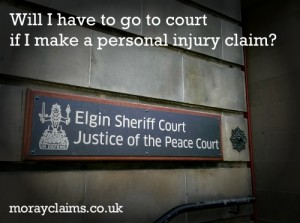Your solicitor’s aim is to maximise the amount of compensation you receive for your injuries and other losses. The “top line” value of your claim needs to be as high as possible, but that’s not all. You also want to try to reduce the amount you will lose in having to pay legal fees from your compensation. For most people who become a personal injury client of Moray Claims / Grigor & Young, you will lose 10 per cent of your compensation in paying what is called a "Success Fee". In a minority of cases, though, no deduction will apply at all. The basic difference is between claims covered by legal aid (no deduction ever) and claims we deal with on a no win-no fee basis (10 per cent deduction in most cases and, rarely, 20 per cent). So , how much does a personal injury claim cost? And how can you minimise what you will have to pay out of your damages? As we will see, it can mean the difference between receiving 100% of your compensation and only 80% - and the Continue Reading
How Speed Affects the Outcome of Pedestrian Road Accident Collisions
Escape velocity is the speed an object must reach to break the bonds of a planet’s gravitational force and get into orbit. To enter orbit around the Earth, for example, a spacecraft needs to be going at a staggering 7 miles per second (25,000 miles per hour). This creates a difficult series of connected problems. The vehicle requires a lot of fuel. Fuel adds weight. More weight means more thrust is required. Greater thrust demands more fuel. And so it goes on … Another situation where speed has a crucial effect on the outcome is in relation to pedestrian road traffic accidents. In this article, we will consider the significance of vehicle speed in pedestrian collisions. Secondly, we will consider the effect of some other factors apart from impact speed. Finally, we will look at some of the implications for measures which can be taken to improve road safety. Frontal impact collision research has considered the effect of speed. Research into road accidents involving Continue Reading
Do you have a compensation claim for a minor injury?
Caffeine is the most widely-consumed psycho-active substance in the world. By ‘psycho-active’, we mean that it has effects on the central nervous system such as improving energy levels, increasing alertness and, in some people, elevating their mood. Many substances are attractive to us partly because they contain caffeine. If you search online using the phrase “tea has more caffeine than coffee”, you will get about 835,000 results. The wording of the search reflects a commonly-held conception: that tea works better than coffee as a caffeine-delivery system. But is that correct? Studies have shown that tea leaves have more caffeine than coffee beans. But that’s not how things finish up in the cup. The main difference between tea and coffee is how much of it gets leeched into the hot water used to make the drink. In fact, you end up with about twice as much caffeine in a cup of coffee as in a cup of tea. It’s all about surface area: coffee beans get ground up, so more of the Continue Reading
3 Non-Financial Benefits of a Personal Injury Claim
What are the non-financial benefits of a personal injury claim? Personal injury claims are about compensation for loss. The law measures that loss in money terms, even though some losses cannot easily be valued financially. It’s straightforward to work out the wages you’ve lost from being off work as a result of your accident. Well, it is compared to valuing your injuries. And how can you put a fair value on a broken arm, let alone the death of a relative, anyway? In making a personal injury claim, money may not be the most important factor for you. For some people, it’s of no importance at all. The law looks at personal injury claims in terms of money but there are non-financial benefits associated with personal injury claims and it is worth considering them. They might be what persuade you to proceed with a claim where, otherwise, you might decide not to bother. Better understanding of your injuries, present state of recovery and prognosis In cases of serious injury, Continue Reading
Making A Claim For A Motorcycle Accident in Moray
You get an amazing feeling of freedom when you ride a motorcycle. You have the opportunity to enjoy the freshness and beauty of the countryside without being cooped up in a car. We are lucky to live in such a beautiful part of the world as Moray and come the Spring, and more reliable road conditions, motorcyclists are to be found everywhere from the A96 to the smallest back road. Along with the pleasure of motorcycle riding, however, comes the risk of an accident. The most recent statistics show an increase in accidents involving more vulnerable vehicles, such as bicycles and motorcycles, which is a concern. If you have an accident while out on your motorcycle and suffer injury, how do you go about making a claim? Personal injury damages The most important claim is for compensation for your injuries. Motorcyclists are very exposed if there is any sort of collision and, as a result, injuries tend to be multiple, severe and, often, life-changing. We have experience Continue Reading
Claiming Personal Injury Compensation – Don’t Think Twice, It’s All Right
There are so many factors to discourage you from making a personal injury claim these days. The Westminster Government almost seem to be trying to outlaw claims for whiplash injury and there is a constant undercurrent of suggestion that such claimants are fraudsters or at least exaggerating their symptoms. So, if you are thinking of claiming personal injury compensation following an accident, should you do so? An unattractive “entitlement” mentality Most of us find it difficult to warm to people who claim entitlement to positions or privileges just because of who they are or what they may claim to have done in the past. But legal entitlements are different Fair enough, the legal entitlement to personal injury compensation, where the injury is caused by the negligence of another, is not a "deserving cause" in everyone's eyes. Usually, these doubters are folk who have never been in the position of an injury victim themselves. It is different when you are the victim. Personal injury Continue Reading
Claims for Compensation after Assault
Most of our articles dealing with claims for personal injury cover injuries which have been caused as the result of someone’s negligence. In other words, the injuries were not caused intentionally. But what about situations where you have been injured because someone deliberately assaulted you? As a victim of crime you may be able to claim compensation. So what mechanisms exist to deal with claims for compensation after assault? Criminal Injuries Compensation Scheme The Criminal Injuries Compensation Authority (CICA) is a Government body set up to deal with these claims. Elgibility rules and exclusions There are strict rules on eligibility and certain factors can exclude you from making a CICA claim. However, you may be entitled to make a CICA claim if you have been a victim of violent crime or if you were injured while trying to prevent a crime or stop a criminal or while assisting a police officer. Being resident in the UK can be important as there are some Continue Reading
Personal Injury Lawyer In Moray (How To Focus Your Search For A Solicitor)
If you live in Moray or have been injured in an accident which happened in Moray, here are some factors to consider if you need to choose a solicitor to help you with a personal injury claim. Are you going to use a local solicitor or one who is at a distance from you? A Moray solicitor will have local knowledge, which could be useful and give them an advantage over someone who is not based in the area. For some types of accident - for example, pavement tripping accidents - it can be crucial for someone (often, the solicitor!) to visit the locus of the accident as soon as possible after the accident in order to take photographs and make measurements. A local solicitor is going to be better-placed to carry out such work. Or maybe not. Google Streetview and other free online tools mean that a virtual visit to a locus is often possible and this may be sufficient, depending upon the type of accident. So, it may not be essential to have a local solicitor to deal with your Continue Reading
What Can I Claim Personal Injury Compensation For?
The answer to the question "What can I claim personal injury compensation for?" is something which is bound to influence you in deciding whether or not it is even worth your while bothering with a claim at all. If you are injured in an accident and need to make a claim for compensation, there are various possible elements which can make up your claim as a whole. We tend to refer to these as “heads of claim”. Also note that, in this context, “damages” is another word for “compensation”. The way to think about it is that any loss you have suffered as a result of your accident can probably be compensated. Here is a list of some of the most common elements found in personal injury claims. Your pain and suffering The level of compensation you get for your injuries is calculated on a sliding scale. So, the more serious and long-lasting your injuries, the greater the amount of compensation you will receive. Multiple injuries will increase the value of the claim here, though Continue Reading
How Your Solicitor Gets Paid No Win-No Fee in Scotland
(EDITOR'S NOTE: Some of the content of this article has been superceded. The Voluntary Pre-action Protocol referred to is now a Compulsory Protocol (from November 2016) but we have left this article in place because it provides a useful reference point back to the previous system for comparision purposes). If your solicitor takes on your personal injury claim no win – no fee then it means you will have nothing to pay if the claim does not succeed. But how does the solicitor get paid if the claim is successful and you receive compensation for your injuries and other losses? Your solicitor will have a written agreement with you about how fees are to be calculated if you win your case. This is called a Speculative Fee Agreement. Often, it will provide for charges at an hourly rate and it may even cover what is known as a “success fee”. This is an additional percentage that can be charged to the hourly rate in certain circumstances – usually if the claim was higher risk or more Continue Reading
Your Personal Injury Claim: How Long Will It Take?
It is extremely difficult to say how long a personal injury claim will take but the factors involved are not all within the control of the other party or their insurers, despite what some people think. “I know they will probably try to drag it out for years,” is a comment we often hear from people considering making a compensation claim for injuries suffered in an accident. "They" refers to the person or organisation responsible for paying the compensation that is due – which is usually, but not always, an insurance company. Your personal injury solicitor will constantly be keeping an eye on what is the next step required in relation to your claim. At any given time, your solicitor should be able to give a best estimate of how much longer it will all take. Factors which could have an effect on the length of your claim Some things which will affect how quickly your claim can proceed to a conclusion are: How complex the case is; The severity of your Continue Reading
Will I Have To Go To Court If I Make A Personal Injury Claim?
Many people worry that, if they pursue legal action, they will have to endure the stress and hassle of a court hearing (known as a ‘Proof’, in Scotland). We get this question time and again: "Will I have to go to court if I make a personal injury claim?" Solicitors and other legal professionals are more used to the court setting, of course, though it is not stress-free for them either. We understand that the prospect of having to go through court proceedings is daunting, perhaps to the point that it may put you off the idea of making a claim entirely. Most claims settle "out of court" It is important not to get too hung up on the idea that your claim will have to “go to court”. The main reason for this is that, in the vast majority of cases, claims are settled out of court – either because it is never necessary to raise a court action at all or because the claim settles after a court action is raised but before the Proof. The parties on each side of the claim will Continue Reading
